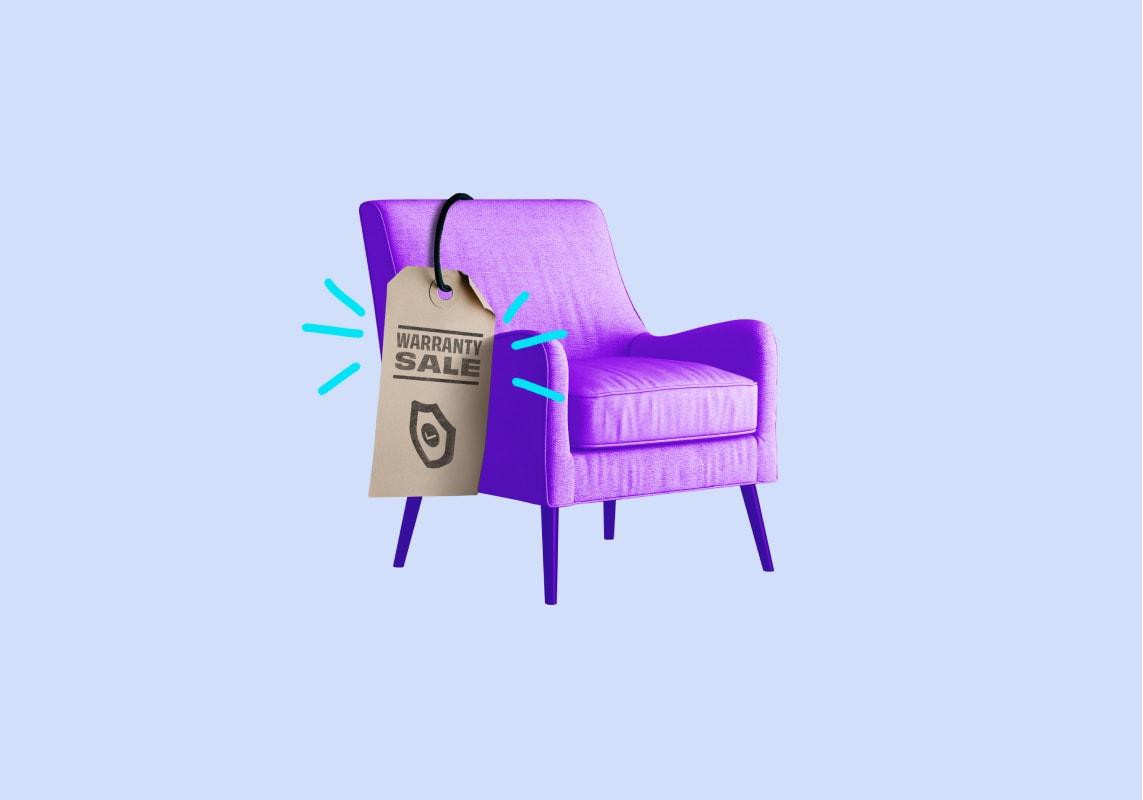You sell couches. Beautiful ones. But your customers don’t need a new couch every six months.
If your customers aren’t coming back to your site regularly, how can you keep in touch with them and make sure you’re top of mind when they are ready to buy another piece of furniture? How can you make sure that they had such a great experience buying from you, and felt so good about their purchase, that you’re their first choice for their next expenditure?
You can offer extended warranties .
Selling eCommerce furniture warranties is a great way to nurture ongoing relationships with customers while also driving up your profit margins and making sure you can capture any lost sales from faulty products.
A win-win-win, if you will.
Why Extended Warranties are Important to Your Furniture Business
Per the FTC , warranties aren’t required by law , but come with most major purchases.
Extended warranties are additional layers of protection that consumers can buy to ensure that they’ll be covered in the event of a faulty product or even an accident. They’re layered on top of regular manufacturer warranties and can often provide customers increased peace of mind for expensive or important purchases.
Here are the ways extended warranties can help an eCommerce furniture business owner:
Drive additional revenue
Offering an extended warranty on your products adds a new stream of income to your business (and a pretty high-margin one at that). When customers buy big-ticket items and add on purchase protection, you’ll see an increase in average order value without having had to invest in new product development.
A good extended warranty program should be able to integrate into your checkout flow quickly, in a matter of hours or, at the most, days, giving you a fairly immediate way to boost sales and drive revenue.
Improve customer experience
Offering extended warranties gives buyers peace of mind. It’s easier to shell out for a major purchase knowing that if something goes wrong, they’re covered. And if the extended warranty partner you choose offers fast and helpful customer service, that further elevates the overall customer experience.
If they do have to get a product repaired or replaced, you’ll want to make sure that their experience during that process is as pleasant as possible.
Capture lost customers
You don’t want your products to fail, but that doesn’t change the fact that sometimes they do. When that happens—whether it’s a chair that arrives covered in nicks or a sofa bed that keeps popping out springs—you can easily lose a customer.
Extended warranties help secure second (and third and fourth) sales from customers who would otherwise have churned out after a product failure.
Offer better touchpoints
The average American gets 200 emails a day, which is bordering on ridiculous. It makes sense that the large majority of them never get read. But email is a key channel for communicating with clients, increasing sales, and building a brand—so how can brands stand out?
Transactional emails on extended warranties are the way in. As a touchpoint Trojan horse , those emails provide value to the recipient while also giving retailers a great way to pursue sales, customer success, and community-building goals.
What to Look for When Choosing a Furniture Warranty Provider
If you’re deciding on an extended warranty partner for your furniture business, you’ll want to start by grading your options against several key considerations :
Flexibility in what’s covered and experience insuring it
Insurance providers who focus on the consumer electronics niche may not be of much help to you when it comes to securing coverage for your couches and chairs. Some partners have specific niches, so make sure that the one you choose covers all of the products you’re selling.
You’ll also want to make sure that the insurance provider has experience covering those types of products, including whether they have a well-developed service center network, a well-staffed customer service team, and experience with any of your competitors.
Ease of use by customers
A warranty program that your customers can’t understand or navigate won’t do you any favors. Look for a furniture warranty provider with customer-friendly language, simple terms and conditions that don’t require a law degree to decipher, and a customer portal with easy navigation.
Ease of use by your team
As you start offering warranties and want to fine-tune how they show up in your sales flow, you’ll want to be working with a warranty partner that makes it as easy as possible to have multiple users, to customize permissions per user, and to automatically run in the background of your site as customers make purchases.
Offers regular, automatic reporting and analytics dashboards are good things to look for, too. You’ll want insight into, at a minimum, key metrics like contracts sold, product value covered, contract revenue earned, and profit.
Branding options
You’ll want to make it clear to buyers that your extended warranty program is something offered by your business and that protects their purchases. Look for customizable call-to-actions and branding opportunities to add your logo, color scheme, font, and brand voice to the warranty program so that it integrates cleanly into your site.
Projected revenue
Ask any extended warranty partner you’re considering working with how much revenue you can expect in a finite time period after starting to work with them, and see what they say. You’ll want to make sure that they’re experienced with revenue planning and can walk you through the direct and indirect revenue effects of their program.
For instance, here’s a free Clyde revenue worksheet that does just that.
5 Tips for Selling & Managing Furniture Warranties Through Your Website
To make the most of your furniture website’s extended warranty program, make sure you:
Use CTAs at different points in the purchase process. Offering a new on-site service requires some experimentation, so make sure you try different methods of letting customers know what their options are. For instance, Clyde customers can try on-site options on product pages, on modals that pop-up after products are added to a cart, or on the cart page itself. Many businesses find the most success with integrating co-branded CTAs in all three places.
Optimize pricing. You’ll want to adjust your margin so that you can find the price point that works best for both your customers and your business. Clyde’s customers can use the Autopilot Margins feature to automatically adjust your margin based on price sensitivity and attachment rate in order to drive more revenue.
Take advantage of post-purchase communication. Transaction emails, like order confirmations and extended warranty options, are opened more than other emails, so they’re a great way to build customer loyalty by providing something valuable but also branded. Work with your warranty provider to send helpful and accurate warranty information in post-purchase emails that can be combined with upsell opportunities.
Review warranty insights regularly. Whether your warranty provider comes with regular customer service reps, online analytics, or both, make sure you’re reviewing insights about how your program is performing. That data can help drive product improvements as well as help you hone in on what products your customers value most, which are those products that they’re most interested in protecting, and at what price point, which can help you with marketing as well as new product development.
A/B test your offerings. Once you’ve got a few weeks’ worth of data under your belt, use those insights to run targeted experiments on pricing, CTA language and positioning, and branding to see if you can find an even higher attachment rate. Each company will be different, but the Clyde team has seen attachment rates jump up three, four, or even ten times what they were previously, depending on how CTAs are activated and designed.
What The Future Holds for eCommerce Furniture Warranties
Furniture has seen a boom season over the last year, per the Washington Post , as people have been stuck inside and have decided to invest in their space. La-Z-Boy, for instance, is still five to nine months behind fulfilling orders, and Overstock.com saw sales surge by 75% last year, driven in part by spikes in demand for home furnishings.
As work-from-home arrangements become permanent and customers continue to look for ways to upgrade their homes, high demand is likely to continue. Retailers who want to distinguish themselves and build long-term customer loyalty will be looking for ways to set themselves apart, including by offering comprehensive extended warranty programs that are easy to use and give customers peace of mind in case anything happens to their major furniture purchases.
Clyde’s fully-managed service and global network of best-in-class insurers is ready to meet that boom. Request a demo today to see how an extended warranty partner could help drive revenue and improve customer experience within minutes of integration.
SIGN UP FOR OUR NEWSLETTER









